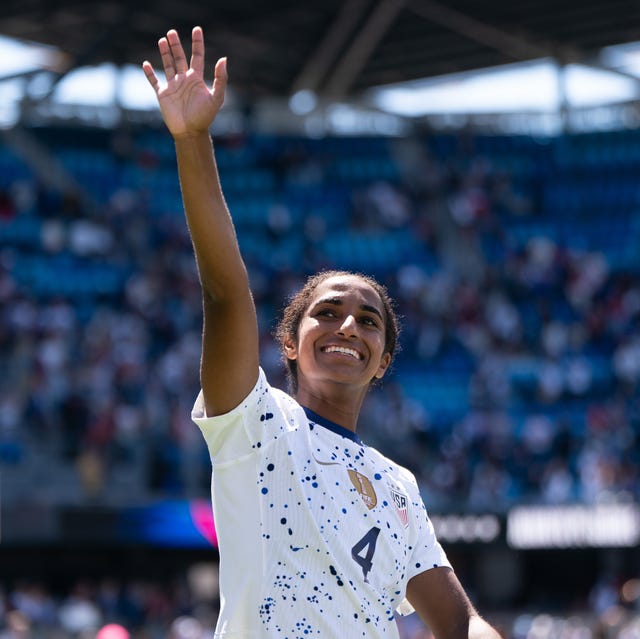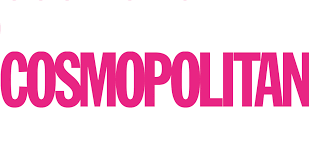All About Olympian Naomi Girma, Team USA’s Once-in-a-Generation Soccer Star
Megan Rapinoe said it best: Naomi is “going to be the future of the team for a long time,” so it’s time to get to know her.

John Todd/ISI Photos/USSF//Getty Images
Watch Naomi Girma playing soccer once and you’ll see why the 24-year-old defender was named Player of the Year for the U.S. Women’s National Team. She’s gracefully fierce and she plays with her mind, heart, and body…in that order. Many call her a generational soccer sensation—including former teammate Megan Rapinoe, who said, “She’s just fucking good….She’s going to be the future of the team for a long time”—but this first-generation American has bigger plans than just leading Team USA’s Gen-Z-heavy roster toward gold. Naomi is out to change the world.
 Brad Smith/ISI Photos/USSF//Getty Images
Brad Smith/ISI Photos/USSF//Getty Images
Born to Ethiopian immigrants in San Jose, the Olympian grew up playing in a “super casual” soccer league created by her dad as a way to get the Ethiopian community together. She worked her way through YMCA soccer camps and summer clubs into Stanford University, where she graduated with a 3.92 GPA and a degree in symbolic systems. She is already back working on her master’s in management science and engineering (translation: she’s a brilliant scientist). After losing her best friend in college to suicide, Namoi purposefully began a movement to provide mental health resources for young athletes.
We sat down with Naomi before she took the field to represent Team USA at the 2024 Paris Olympics, and here are seven things you should know about this brainy all-star Olympian.
Naomi is a younger player on Team USA’s soccer lineup.
“I think we have a good balance on this roster,” Naomi told Cosmopolitan. “We have a lot of older players who have been to a lot of tournaments and know what it takes to win, and I think a lot of the younger players have had a lot of good experience, so really relying on both groups is really important. I mean, we talk about it a lot: Everyone is a leader in their own way.”
Naomi loved soccer early on.
“I would play every Saturday with Maleda [Soccer Club], and they would split us up in small, medium, and big kids, and then one of the dads would take each group. We would just play. I was always having so much fun playing and I never wanted the games to end, whereas a lot of other kids were more interested in going to the playground. When I was in third grade, I was begging my mom to sign me up for a club team. I ended up going to a training with my best friend from the YMCA and that’s how I started playing competitively.”
Losing her teammate and best friend, Katie Meyer, changed Naomi’s attitude toward mental health.
“Mental health matters. I think a lot of times we’re told, ‘Just keep grinding,’ ‘Put your head down,’ ‘Keep working,’ that type of thing. A lot of times, yes, you do need to do that, but it’s also really important to realize when it’s not something physical and you need to take care of your mental health. Losing my best friend to suicide and hearing a lot of other people’s stories who can relate or who have dealt with mental health issues in similar or different ways, it is just clear there needs to be action being taken. That’s so important to me. I want to talk about it, I want to make sure people are addressing it.”
And Naomi started a movement.
“I started Create the Space with Common Goal. It educates youth coaches so they can go to their teams and teach them different ways to handle grief or stressors that come up as a kid gets older. When you’re a youth athlete, a very influential adult in your life is your coach. You spend a lot of time with them, so we’re equipping them with ways to teach kids that idea. In the first year, we opened mainly in community organizations, so grass roots organizations for refugee kids or kids in marginalized communities where mental health has an even bigger stigma. It’s something that’s not talked about or addressed enough. I think there is a shift in the sports world, and I think it’s exciting to see so many athletes and people who have platforms speak out about it and really make a difference.”
Naomi’s dad was a refugee.
“Given my family’s history in coming to the U.S. it means so much that now I have this opportunity to represent the U.S., a country that’s given me and my parents and also my extended family so many opportunities and a better life. My dad fled to Sudan and then came to the States from there when he was in his late teens. He came and didn’t speak English and hadn’t graduated high school and ended up getting a bachelor’s in electrical engineering and worked as an electrical engineer for most of my life. He’s incredible.”
Naomi speaks Amharic.
And growing up surrounded by a strong Ethiopian community instilled early pride in speaking her heritage language.
“I started playing at Maleda Soccer [Editor’s note: ‘maleda’ translates to ‘dawn’ in Amharic, one of Ethiopia’s languages], which was this community organization that my dad started in San Jose,” Naomi said. “So it was just for the Ethiopian community to get together and for the parents to hang out and for the kids to play soccer.”
 Marc Atkins//Getty Images
Marc Atkins//Getty Images
Naomi and her Team USA teammate, Trinity Rodman
And finally, Naomi has a sweet pregame ritual.
“My pregame meal is always pancakes! I love the carbs. [laughs] They’re easy to digest. Usually pancakes and a banana is my pregame ritual. With maple syrup, of course.”

